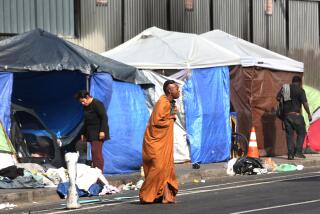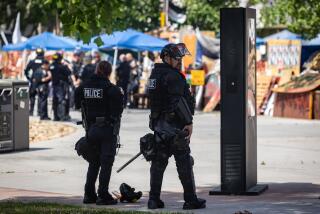Occupy L.A., city inching into endgame for City Hall camp
The first outlines of an endgame for Occupy Los Angeles began taking shape as protesters considered a controversial package of incentives to encourage the peaceful resolution of their seven-week demonstration and details emerged of a possible Monday deadline for protesters to leave their City Hall camp.
Protesters who have been in negotiations with city officials said that they have asked for an extension of the departure deadline and that officials are considering their request.
A spokesman for Mayor Antonio Villaraigosa would not comment on the date, saying only, “We’re still in negotiations, and no date or deal points have been firmly established.”
Los Angeles political leaders have walked a tightrope in their dealings with the protesters since the demonstration began on Oct. 1, and they have been tight-lipped on the discussions.
Negotiations over how the protest will end have taken place amid a web of complicating factors, including strong backing of the movement by labor unions, an early, official endorsement of the camp by the Los Angeles City Council and a controversy-averse Los Angeles Police Department, which is trying to encourage public perception of the force as community-minded.
Images of cops in riot gear rousting Occupy encampments across the nation have become ubiquitous in recent weeks, as many cities try to prevent the tent gatherings from becoming troublesome permanent fixtures. But Los Angeles has taken a different tack.
Officials have been quietly searching for common ground with Occupy representatives for several weeks, culminating in a highly unusual offer announced by protesters Monday: If the campers move off the City Hall lawn, the city will lease them work space for $1 a year, as well as provide land for protesters to garden.
As political blow back to the proposal mounted Tuesday, city officials backed away slightly from the offer, according to Scott Shuster, a protester who said he has been present at the meetings, which are headed by Villaraigosa’s deputy chief of staff, Matt Szabo. Shuster said it was unclear whether that offer was still on the table.
He said it also was unclear whether protesters would accept it, noting that any decision at Occupy requires a 90% consensus. “Things move slowly here,” he said.
Camp negotiators had requested a Jan. 3 deadline to leave, so protesters could fully consider the city’s proposal and craft any counter-demands. Some protesters are against any plan that calls for them to decamp.
“There is a sizable population who say they won’t leave under any circumstance,” Shuster said.
That posture by some demonstrators, coupled with a push toward a departure deadline, could set up the very sort of clash Police Chief Charlie Beck has been determined to avoid.
The controversy over actions at UC Davis, where police used pepper spray Friday to break up an Occupy protest, is a ready reminder for Beck and other L.A. officials how quickly a forced eviction can turn violent.
“We have a significant investment in the outcome of these negotiations,” Beck told The Times on Tuesday.
He said Los Angeles police have played a major role in the talks and confirmed that he speaks regularly with a National Lawyers Guild representative who has sought to serve as a liaison between the demonstrators and city leaders.
Beck has worked hard to nurture a new image of the LAPD as a problem-solving agency, and Tuesday he pointed to a positive result of the Occupy L.A. experience. The camp has created “a big opportunity to train the [LAPD] on the value of building relationships,” he said.
But he also noted the City Hall camp eventually has to be cleared. “This is work that is very much unfinished,” he said.
Several of the city’s labor unions have also been a part of the conversation.
The movement continues to be strongly endorsed by the powerful head of the Los Angeles County Federation of Labor. And Mike Garcia, the head of the Service Employees International Union United Service Workers West, said he has talked to the mayor several times about allowing the protesters to stay.
Big labor, which can make or break politicians’ careers in largely Democratic L.A., flexed its muscle again last week, pouring hundreds of demonstrators into downtown streets in a joint street-blocking action with Occupy protesters. County labor federation chief Maria Elena Durazo pointedly reiterated support for Occupy L.A. and upped the ante by backing demonstrators’ effort to expand their camp to the Bank of America Plaza on Bunker Hill.
City Councilman Ed Reyes acknowledged that unions hold considerable sway. “We do listen to the unions, because unions make up a large part of our constituency,” he said. But he said city officials also are sympathetic to the grievances of the Occupy movement because many residents here have been hit hard by the foreclosure crisis.
The council endorsed the protest early on and some members, including Councilman Richard Alarcon, have spoken out strongly in support of it.
But Councilman Bernard C. Parks said Tuesday that he is “concerned with the precedent it sets.” Other protesters in the future could employ tactics similar to the Occupy group — and expect to win similar favors from the city. “With the next group of protesters that comes in, do you up the ante?” he said.
He said he wondered whether lawmakers would be equally tolerant if anti-abortion protesters or a Neo-Nazi group set up camp outside City Hall.
But protester Pete Thottam said the city’s proposal of office space and other enticements to leave has strengthened the movement’s bargaining position. “We’re not in the defensive position that we were,” Thottam said.
Los Angeles Times staff writer Andrew Blankstein contributed to this report.
More to Read
Sign up for Essential California
The most important California stories and recommendations in your inbox every morning.
You may occasionally receive promotional content from the Los Angeles Times.











